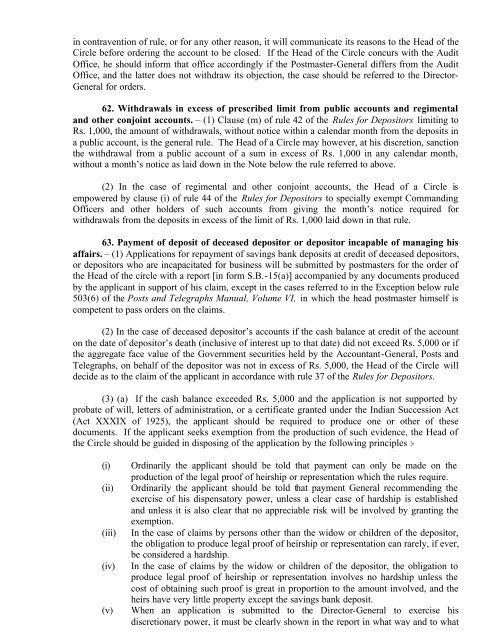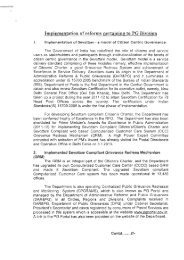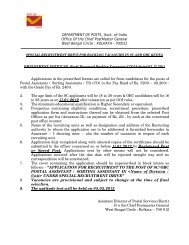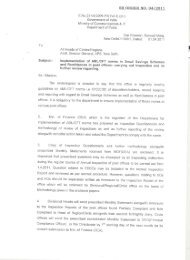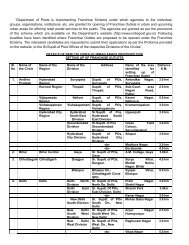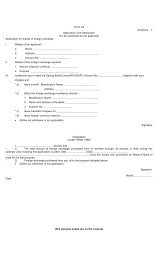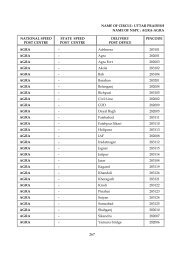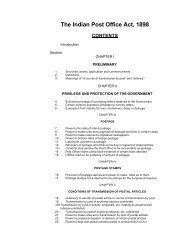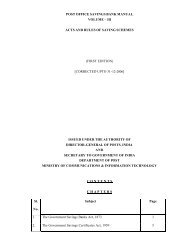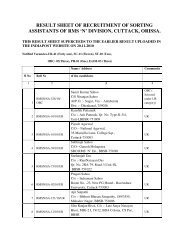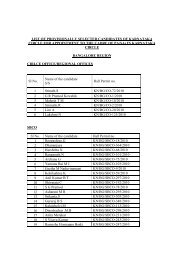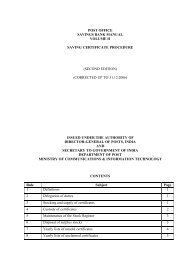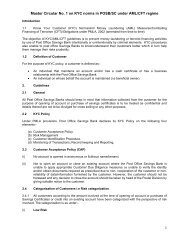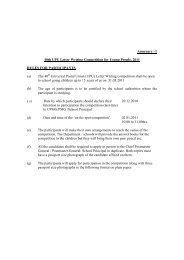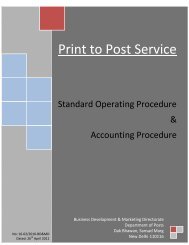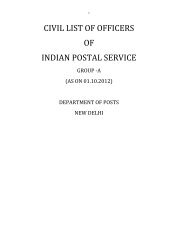Postal Manual Vol. VIII - India Post
Postal Manual Vol. VIII - India Post
Postal Manual Vol. VIII - India Post
Create successful ePaper yourself
Turn your PDF publications into a flip-book with our unique Google optimized e-Paper software.
in contravention of rule, or for any other reason, it will communicate its reasons to the Head of the<br />
Circle before ordering the account to be closed. If the Head of the Circle concurs with the Audit<br />
Office, he should inform that office accordingly if the <strong>Post</strong>master-General differs from the Audit<br />
Office, and the latter does not withdraw its objection, the case should be referred to the Director-<br />
General for orders.<br />
62. Withdrawals in excess of prescribed limit from public accounts and regimental<br />
and other conjoint accounts. – (1) Clause (m) of rule 42 of the Rules for Depositors limiting to<br />
Rs. 1,000, the amount of withdrawals, without notice within a calendar month from the deposits in<br />
a public account, is the general rule. The Head of a Circle may however, at his discretion, sanction<br />
the withdrawal from a public account of a sum in excess of Rs. 1,000 in any calendar month,<br />
without a month’s notice as laid down in the Note below the rule referred to above.<br />
(2) In the case of regimental and other conjoint accounts, the Head of a Circle is<br />
empowered by clause (i) of rule 44 of the Rules for Depositors to specially exempt Commanding<br />
Officers and other holders of such accounts from giving the month’s notice required for<br />
withdrawals from the deposits in excess of the limit of Rs. 1,000 laid down in that rule.<br />
63. Payment of deposit of deceased depositor or depositor incapable of managing his<br />
affairs. – (1) Applications for repayment of savings bank deposits at credit of deceased depositors,<br />
or depositors who are incapacitated for business will be submitted by postmasters for the order of<br />
the Head of the circle with a report [in form S.B.-15(a)] accompanied by any documents produced<br />
by the applicant in support of his claim, except in the cases referred to in the Exception below rule<br />
503(6) of the <strong>Post</strong>s and Telegraphs <strong>Manual</strong>, <strong>Vol</strong>ume VI, in which the head postmaster himself is<br />
competent to pass orders on the claims.<br />
(2) In the case of deceased depositor’s accounts if the cash balance at credit of the account<br />
on the date of depositor’s death (inclusive of interest up to that date) did not exceed Rs. 5,000 or if<br />
the aggregate face value of the Government securities held by the Accountant-General, <strong>Post</strong>s and<br />
Telegraphs, on behalf of the depositor was not in excess of Rs. 5,000, the Head of the Circle will<br />
decide as to the claim of the applicant in accordance with rule 37 of the Rules for Depositors.<br />
(3) (a) If the cash balance exceeded Rs. 5,000 and the application is not supported by<br />
probate of will, letters of administration, or a certificate granted under the <strong>India</strong>n Succession Act<br />
(Act XXXIX of 1925), the applicant should be required to produce one or other of these<br />
documents. If the applicant seeks exemption from the production of such evidence, the Head of<br />
the Circle should be guided in disposing of the application by the following principles :-<br />
(i)<br />
(ii)<br />
(iii)<br />
(iv)<br />
(v)<br />
Ordinarily the applicant should be told that payment can only be made on the<br />
production of the legal proof of heirship or representation which the rules require.<br />
Ordinarily the applicant should be told that payment General recommending the<br />
exercise of his dispensatory power, unless a clear case of hardship is established<br />
and unless it is also clear that no appreciable risk will be involved by granting the<br />
exemption.<br />
In the case of claims by persons other than the widow or children of the depositor,<br />
the obligation to produce legal proof of heirship or representation can rarely, if ever,<br />
be considered a hardship.<br />
In the case of claims by the widow or children of the depositor, the obligation to<br />
produce legal proof of heirship or representation involves no hardship unless the<br />
cost of obtaining such proof is great in proportion to the amount involved, and the<br />
heirs have very little property except the savings bank deposit.<br />
When an application is submitted to the Director-General to exercise his<br />
discretionary power, it must be clearly shown in the report in what way and to what


